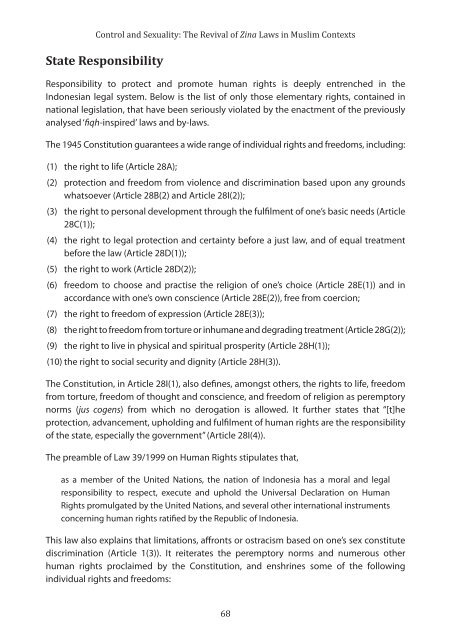control and sexuality
control and sexuality
control and sexuality
- No tags were found...
You also want an ePaper? Increase the reach of your titles
YUMPU automatically turns print PDFs into web optimized ePapers that Google loves.
Control <strong>and</strong> Sexuality: The Revival of Zina Laws in Muslim ContextsState ResponsibilityResponsibility to protect <strong>and</strong> promote human rights is deeply entrenched in theIndonesian legal system. Below is the list of only those elementary rights, contained innational legislation, that have been seriously violated by the enactment of the previouslyanalysed ‘fiqh-inspired’ laws <strong>and</strong> by-laws.The 1945 Constitution guarantees a wide range of individual rights <strong>and</strong> freedoms, including:(1) the right to life (Article 28A);(2) protection <strong>and</strong> freedom from violence <strong>and</strong> discrimination based upon any groundswhatsoever (Article 28B(2) <strong>and</strong> Article 28I(2));(3) the right to personal development through the fulfilment of one’s basic needs (Article28C(1));(4) the right to legal protection <strong>and</strong> certainty before a just law, <strong>and</strong> of equal treatmentbefore the law (Article 28D(1));(5) the right to work (Article 28D(2));(6) freedom to choose <strong>and</strong> practise the religion of one’s choice (Article 28E(1)) <strong>and</strong> inaccordance with one’s own conscience (Article 28E(2)), free from coercion;(7) the right to freedom of expression (Article 28E(3));(8) the right to freedom from torture or inhumane <strong>and</strong> degrading treatment (Article 28G(2));(9) the right to live in physical <strong>and</strong> spiritual prosperity (Article 28H(1));(10) the right to social security <strong>and</strong> dignity (Article 28H(3)).The Constitution, in Article 28I(1), also defines, amongst others, the rights to life, freedomfrom torture, freedom of thought <strong>and</strong> conscience, <strong>and</strong> freedom of religion as peremptorynorms (jus cogens) from which no derogation is allowed. It further states that “[t]heprotection, advancement, upholding <strong>and</strong> fulfilment of human rights are the responsibilityof the state, especially the government” (Article 28I(4)).The preamble of Law 39/1999 on Human Rights stipulates that,as a member of the United Nations, the nation of Indonesia has a moral <strong>and</strong> legalresponsibility to respect, execute <strong>and</strong> uphold the Universal Declaration on HumanRights promulgated by the United Nations, <strong>and</strong> several other international instrumentsconcerning human rights ratified by the Republic of Indonesia.This law also explains that limitations, affronts or ostracism based on one’s sex constitutediscrimination (Article 1(3)). It reiterates the peremptory norms <strong>and</strong> numerous otherhuman rights proclaimed by the Constitution, <strong>and</strong> enshrines some of the followingindividual rights <strong>and</strong> freedoms:68


